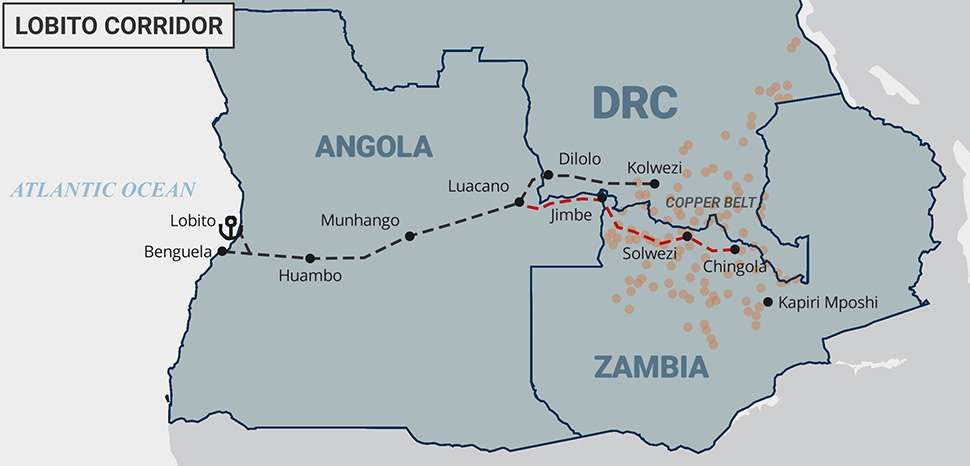President Joe Biden’s historic trip to Angola marks a pivotal moment in US-Africa relations as he seeks to showcase a $3 billion American investment in the Lobito Corridor, a transformative railway project spanning Angola, Zambia, and Congo.
The initiative aims to bolster regional trade, streamline the transport of raw materials, and counter China’s significant economic influence on the continent.
A key stop during Biden’s visit will be Angola’s National Slavery Museum, where he will acknowledge the historical ties of human trafficking that once connected the two nations’ economies.
This visit, the first by a sitting US president to Angola, underscores Washington’s evolving strategy in sub-Saharan Africa, emphasizing infrastructure development alongside traditional approaches of trade, security, and humanitarian aid.
The 800-mile railway upgrade is designed to enhance the export of critical minerals essential for electric vehicles, clean energy technologies, and electronic devices.
Supported by US financing alongside contributions from the European Union, the Group of Seven, African banks, and private investors, the project also mirrors elements of China’s Belt and Road initiative.
White House national security spokesperson John Kirby described the Lobito Corridor as a long-term commitment. “The corridor’s completion is going to take years, but there’s already been a lot of work put in,” Kirby said.
Biden’s visit to the Angolan coastal city of Lobito on Wednesday will include a tour of the corridor’s port terminal, a key Atlantic outlet for regional trade. Kirby emphasized that the project is not solely about outpacing China.
“There is no cold war on the continent,” Kirby said aboard Air Force One.
“We’re not asking countries to choose between us and Russia or China. We’re simply looking for reliable, sustainable, verifiable investment opportunities that the people of Angola and the people of the continent can rely on.”
John Kirby
Kirby highlighted that many African nations have suffered under unsustainable investments, leaving them burdened by debt. “Too many countries have relied on spotty investment opportunities and are now wracked by debt,” he noted.
Biden’s administration hopes the initiative will endure beyond his presidency. With Republican Donald Trump set to assume office in January, Kirby expressed optimism that the project’s significance would resonate with the incoming administration. “Our fervent hope is that as the new team takes a look at this, they see the value too,” Kirby said.

Honoring Angola’s History While Looking Forward
Biden’s visit to Angola’s National Slavery Museum will be a poignant moment. The site, once a 17th-century temple where enslaved individuals were baptized before being sent to America, symbolizes the historical ties of human suffering between the two nations.
Kirby said Biden would deliver remarks acknowledging “both the horrific history of slavery that has connected our two nations, but also looks forward to a future predicated on a shared vision that benefits both our people.”
Before visiting the museum, Biden met with Angolan President João Lourenço, whom he hosted at the White House last year. The two leaders discussed strengthening economic and diplomatic ties.
Biden also met with Wanda Tucker, a descendant of William Tucker, the first enslaved child born in the United States. William Tucker’s parents were brought to colonial Virginia from Angola in 1619 aboard a Portuguese ship. Wanda Tucker, a psychology professor, has actively worked to trace her family’s roots back to Angola.
The last US president to visit sub-Saharan Africa was Barack Obama in 2015. Biden’s trip follows his promise during the 2022 US-Africa Summit to deepen ties with African nations. While delayed by Hurricane Milton earlier this year, the visit seeks to reassure African leaders of Washington’s commitment.
As part of his itinerary, Biden also met with African business engagement leaders, community representatives, and members of Congress. The trip signals a renewed US focus on Africa, where global powers, including China and Russia, are vying for influence.
Biden’s administration has framed the Lobito Corridor project as a collaborative effort aimed at fostering prosperity for African nations. However, as Biden prepares to leave office, the initiative’s long-term success will depend on the continued support of future US leaders.
READ ALSO: NDC Warns EC Over Ballot Destruction, Demands Audit





















